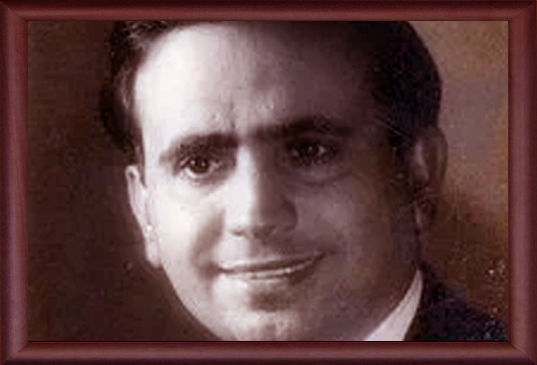Kidar Sharma was born on 12 April, 1910 at Narowal (now in Pakistan) in what was then the Punjab region of India and grew up in a life of poverty. His two brothers, Ragunath and Vishwa had died as infants and sister Taro too died of tuborclosis at an early age. A younger sister Guro survived as did a younger brother Himmar Rai, who would later work with Kidar Sharma in films before establishing himself as a successful Urdu poet.
Kidar Sharma attended the Baij Nath High School, Amritsar where he became interested in painting, theatre, photography besides philosophy. While he was studying in his primary class, as his family could not afford his initial education, he did book-binding for the school library, thereby he could earn four annas (a quarter of a rupee) a day to sustain livelihood and continue his education. After completion of his High school education, he ran away from his home to pursue a career in cinema in Bombay but was unsuccessful in gaining any employment. He returned to Amritsar and continued his studies. He attended Hindu Sabha College where he founded a College Dramatic Society which would later gave him his first break in films.
In his early days, while struggling for his living he also used to paint the portraits of luminaries, religious idols and film personalities. In the early 1930s he finally ran away from his home. After a lot of struggle he joined
New Theatres in Calcutta as a poster painter. Debaki Bose of
New Theatre gave him a chance for still photography for his next venture Seeta (1934). After this he got few more films as a still photographer, such as, Dhoop Chhaon and Pujarin. In 1935, P C Barua gave him a chance to write two songs for his
Kundan Lal Saigal starrer Devdas. These songs established Kidar Sharma as a lyricist. The songs were; 'Baalam Aao Baso More Man Mein...' & 'Dukh Ke Din Beetat Naahin...'. Both songs were sung by Saigal himself.
Kidar sharma wrote numerous memorable songs after that. A list of some of his other most unforgettable songs include- 'Hum Apna Unhe Bana Na Sake...’, 'Jagat Mein Prem Hi Prem Bhara...', 'So Jaa Rajkumari...’, 'Khayalon Mein Kisi Ke Is Tarah Aaya Naheen Karte...’, ‘Teri Duniya Mein Dil Lagta Nahin...’, 'Gokul Se Gaye Girdhari...’, ‘Kabhee Tanhaaiyon Mein Yun Hamari Yaad Aayegi...,’ and ‘Ankhon Mein Teri Yaad Liye Ja Raha Hoon Main...’ –just to name a few.
It may be observed that most of his lyrics are generally worded at a distinct ease, with superb simplicity, a unique style which is close to dialectical prose, spontaneous, effortless and apparently coming from the core of his heart. Kidar Sharma also wrote dialouges for the films like Devdas, Vidyapati,Jogan, Baware Nain, Suhag Raat, Shokhiyaan, Gauri & Hamari Yaad aayegi.
At
New Theatres he had some conflict with Debaki Bose and he left
New Theatres after that and came to Bomaby alongwith his friend Prithviraj Kapoor. He met
Chandulal Shah of
Ranjit Movietone. Chandulal hired him at a salary of Rs 5000. At Ranjit, he scripted and directed his first film ‘Aulad’ starring A.S. Gyani and Romola, which was an off-beat dealing with human conflicts. The film marked the beginning of new wave cinema. In 1940, Kidar made a film called Chitralekha. He hired Jhande Khan as his music composer and asked him to compose all the songs in the same raag -raag Bhairavi. Jhande Khan was astonished at this idea but Kidar convinced him to go ahead. Then again when Kidar was making another film titled Suhag Raat, he made all the songs based on one raag again - raag Pahadi.
It was also Kidar Sharma who launched many faces and talents, and gave them a break. These included Raj Kapoor (Neel Kamal), Geeta Bali (Suhag Raat), Madhubala (Neel Kamal), Mala Sinha (Rangeen Raatein), composer
Roshan (Neki Aur Badi, Baware Nain) , composer
Snehal Bhatkar (Neel Kamal), composer Jamal Sen (Shokhiyaan). In the later half of his career, Kidar Sharma was associated with Children Film Society and produced and directed some classic films like- ‘Jaldeep’, ‘Chetak’ and ‘Dunia Ek Sarai’. The film -‘Jaldeep’ won an award at the Cannes Film Festival.
In the sunset years of his life, Kidar Sharma finished writing his autobiography which he claimed contained dynamite. He entitled it The One and Lonely Lidar Sharma. He even ended it with the bay line: 'Not written by an angel and angels should avoid it'. Kidar Sharma died on 29 April 1999, before he could see his book in print. Yet, the fact remains that as and when a dispassionate history of Indian cinema will be written, one name amongst the greats of ‘Silver-Screen’ will be that of –Kidar Sharma; and what he wrote and
Mubarak Begum recited ‘Kabhi tanhaiyon mein bhee, hamari yaad aayegi’ for his film -‘Hamari Yaad Aayegi’ will find its meaning for various reasons. It will also continue to haunt millions of zealous lovers and ardent critics of Indian cinema.

